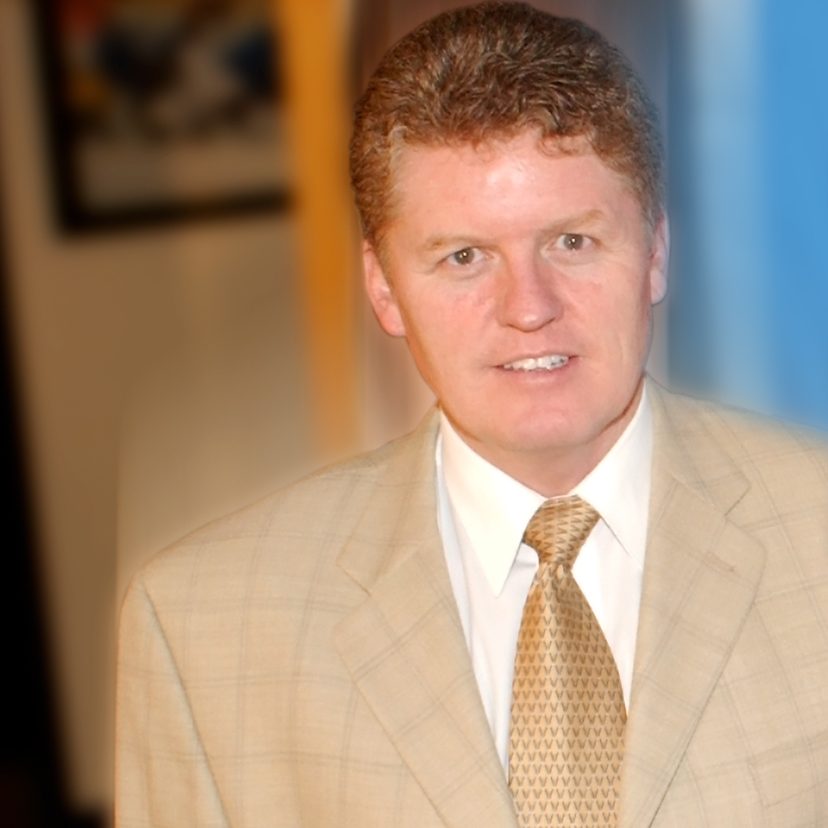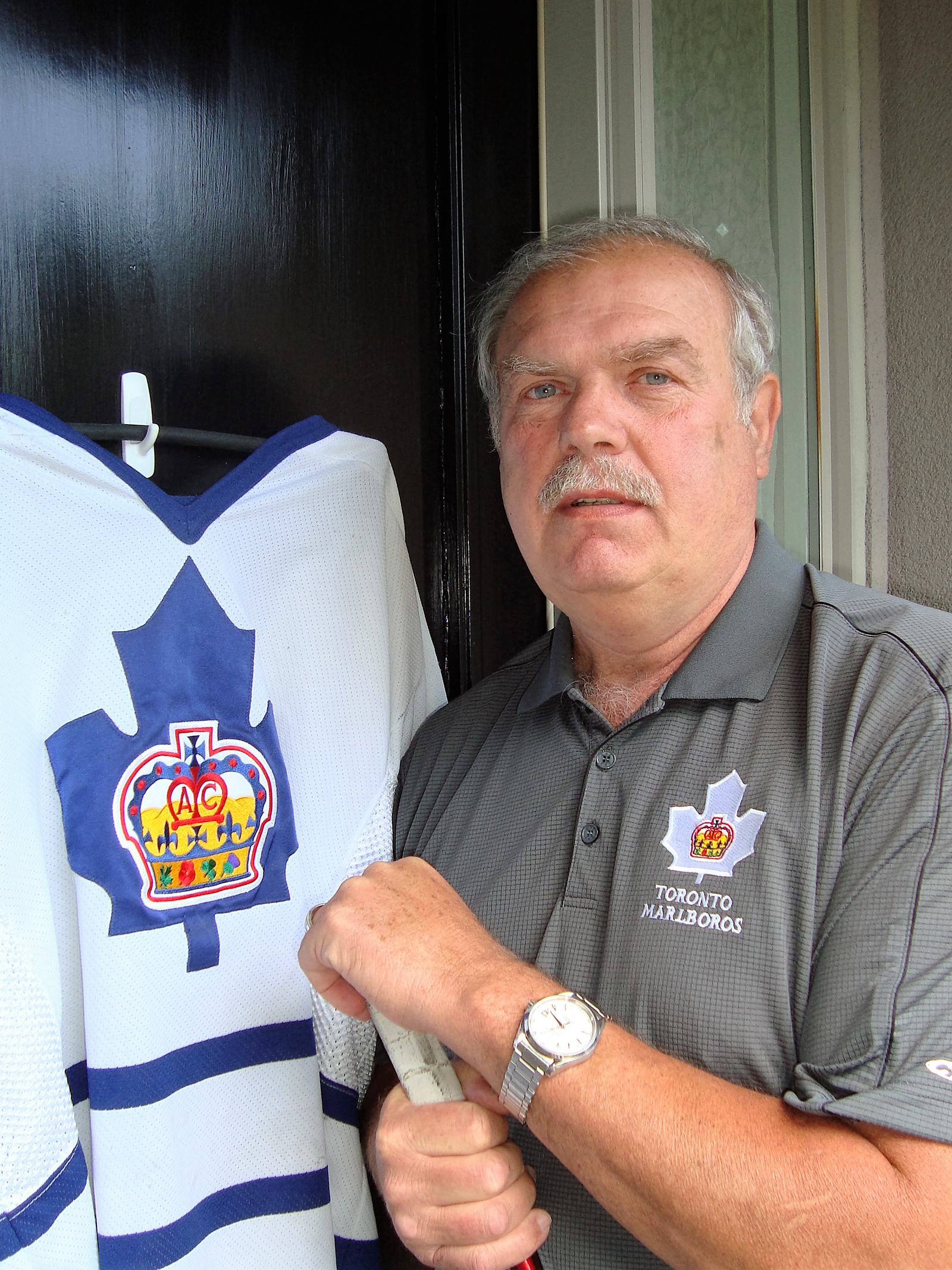Nicoletti regularly reminds the players on his eight Marlboros teams that hockey is a stage in life, not their entire life. The club’s mission is “to nurture the complete player and develop a well-rounded citizen,” which means focusing on family and school before sport.
“That’s a core value for me,” Nicoletti said. “And if they keep that in perspective, they’ll have a very valuable experience through hockey.”
Keeping hockey in perspective is something Nicoletti and his coaches stress with parents as well. “Our kids are in the top 10 percentile of ability level across the country. They’re really talented kids,” he said. “And as a result, sometimes parents’ egos get the best of them, and they don’t understand that there’s more to growing up than playing hockey.”
Teaching and development are top priorities for Nicoletti, a retired educator who learned at a young age the importance of mentorship. Hugh Bolton, an Etobicoke resident who won a Stanley Cup on the Toronto Maple Leafs blue line in 1951, was Nicoletti’s high school football coach at Scarlett Heights. Bolton’s “quiet leadership and firm style” made a lasting impression. Tom Watt, a professor and coach at the University of Toronto, was another mentor to Nicoletti, who was an all-star on the Varsity Blues football defensive line at U of T.
He enjoyed hockey but said he only played for fun. That might be due to his first experience with the Marlboros, which was less than auspicious.
When he was nine or 10, Nicoletti went to George Bell Arena near Runnymede and St. Clair, all set to try out for the club. But he was met with an unwelcomed surprise—the tryout cost two bucks. “Sounds like an insignificant cup of coffee today, but in 1961, two dollars was a significant amount of money,” he said. “And I didn’t have it, so I couldn’t try out.”
Years later, he and Paul Dennis—football teammates at Scarlett Heights who both became teachers—decided they wanted to coach youth sports together. Frank Bonello, who ran the Marlboros at that time, offered the pair the chance to coach the 1983–84 midget team. “And we never looked back,” Nicoletti said. “Paul made a career out of it. He went to work with the Maple Leafs (as a player development coach), and I stayed with the Marlboros all the way through.”
The son of hardworking Italian immigrants—his father Bruno was a bricklayer who laid the paving stones at Etobicoke City Hall—Nicoletti said sports were a welcome outlet as a child. “With working-class parents never being home, that was my refuge,” he said. “Sports really gave meaning to life.”
As did education. After graduating from U of T, he became a high school physical education teacher, eventually shifting into a long career as a VP and principal. “I never worked a day in my life,” Nicoletti said. “I enjoyed teaching Phys Ed, and I was able to give back to kids and watch kids perform to their maximum level.”
That job satisfaction continues with the Marlboros, where Nicoletti has the pleasure of seeing players reach their potential on the ice while developing relationships with their families. He is grateful to have attended weddings of former players, get together for dinners, and reunite with former players and students who enrol their own children in the Marlboros program.
Nicoletti speaks of one former player who, not long before his death, called his old coach to share how much those years with the Marlboros had meant to him. “That was a touching moment,” Nicoletti said. “You make a difference in people’s lives. That’s really what it’s all about.”
Coaching led to Nicoletti becoming the Marlboros general manager, before taking on the top job for the 1992–93 season. Today he oversees eight teams and coaching staffs, encompassing 130 players aged nine to 15 (minor atom to minor midget). “There’s a lot going on to manage those hockey players year in and year out, but I have a lot of support,” he said. “Lynn Dennis, Paul’s wife, manages the books. She’s been a godsend. And I have a terrific general manager in Mike Shraba, who’s been with me from the start.”
Along with developing hockey players and good citizens, Nicoletti sees his mission as upholding the Marlboros legacy, which stretches back to the early 20th century. When Toronto Maple Leafs owner Harold Ballard was in charge, the Marlboros practiced at Maple Leaf Gardens. The team shed its junior A affiliation in 1989, and Ballard died the following year. But at the urging of the Ballard family, who cited their late patriarch’s love of the Marlboros logo, the team endured. “We were basically entrusted to keep this logo going in minor hockey, and we’ve done so for the last 30 years,” Nicoletti said.
He’s done so with the help of many dedicated volunteers, parents, sponsors and “quality guys” behind the bench like Dan Brown, Paul Coffey and Steve Thomas. It’s not uncommon for a Marlboros coach to take a break from the team to raise their family and be welcomed back later in life. “That’s the kind of loyalty that we have,” Nicoletti said. “There’s no shortage of quality people that want to join this organization because of the respectability and the success that we’ve had.”
Those coaches have produced many great Marlboros alumni—Nicoletti mentioned John Tavares, Connor McDavid, Jason Spezza, Rick Nash and Connor Brown, to name a few—that distinguishes themselves as much by their character as their hockey exploits. “The integrity component is huge, and it can’t be taken lightly,” said Nicoletti. “It’s not just about what happens on the ice.”
Under Nicoletti’s leadership, the Marlboros make remembrance a priority. Every year, players wear a special Remembrance Day jersey and learn about Canada’s military veterans and the meaning of the poppy. “This is a fantastic country we live in, and kids don’t think back enough,” Nicoletti explained. “They don’t appreciate the sacrifices that people made to give us the freedoms that we have.”
Nicoletti’s pride and joy is the Toronto Marlboros International Holiday Classic, which sees more than 130 teams converge in Toronto from across Canada and the United States for a late December tournament that might be the biggest in the country, if not the continent. Some 200 scouts evaluate the 2,000-plus athletes, for whom the tournament is a chance to turn some heads.
“It’s intense for five days, a lot of work, but a huge amount of fun,” Nicoletti said of the Classic, now in its 23rd year. “I can remember one final game a few years back, it was (Steven) Stamkos against Tavares. It was phenomenal to see them as 15-year-olds play against each other.”
Nicoletti gives the credit for his accomplishments to his wife Patti. “She’s always there supporting all the things that I’ve done,” he said. “She’s never said no to all my nights away from home.”
Their three sons—Michael, Daniel and David—each played seven seasons with the Marlboros and now coach in the organization, a source of no small pride for their Dad. When she was younger, their daughter Valerie was an accomplished figure skater with Silver Blades in Etobicoke and helped Marlboros players improve their power skating.
Jim and Patti have put in many volunteer hours at Sick Kids Hospital, a practice that started after their sons were treated for concussions. Jim was honoured to accept the 2006–07 Ontario Hockey Federation volunteer of the year award for his contributions to youth hockey.
Looking ahead, Nicoletti has no plans to slow down. As he tells his Marlboros family, “We have a heritage to be proud of and the future continues to shine as bright as our golden logo.”










